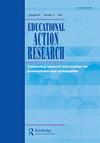Enhancing teaching and learning through the co-creative learning community approach
IF 1.2
Q3 EDUCATION & EDUCATIONAL RESEARCH
引用次数: 1
Abstract
ABSTRACT This study is positioned at the crossroads of pedagogical action learning and action research, as it addresses the challenges in designing and implementing action-learning approaches in the Middle East. In particular, it focuses on the United Arab Emirates (UAE) and draws from a reflective analysis of a university – industry ‘business challenge’ collaboration. This resulted in the development of the co-creative learning community (CCLC) approach in which students, instructor, academic peers, and business practitioners can engage in co-creative, collective learning. The CCLC model was found to be an effective, learner-centric approach that can improve student engagement while addressing complex learning goals, as it requires active collaboration and knowledge exchange between the learning community participants. The CCLC model developed in this study will benefit university faculty in the Middle East who aim to incorporate action learning in their classrooms to facilitate the learning of a more complex set of skills, as expected from 21st-century higher education institutions.透过共同创造学习社区的方法,加强教与学
本研究定位于教学行动学习和行动研究的十字路口,因为它解决了在中东设计和实施行动学习方法的挑战。它特别关注阿拉伯联合酋长国(UAE),并借鉴了对大学-企业“商业挑战”合作的反思分析。这导致了共同创造学习社区(CCLC)方法的发展,在这种方法中,学生、教师、学术同行和商业从业者可以参与共同创造的集体学习。我们发现,CCLC模式是一种有效的、以学习者为中心的方法,可以在解决复杂学习目标的同时提高学生的参与度,因为它需要学习社区参与者之间的积极协作和知识交流。本研究中开发的CCLC模型将使中东地区的大学教师受益,他们的目标是将行动学习纳入课堂,以促进更复杂技能的学习,正如21世纪高等教育机构所期望的那样。
本文章由计算机程序翻译,如有差异,请以英文原文为准。
求助全文
约1分钟内获得全文
求助全文
来源期刊

Educational Action Research
EDUCATION & EDUCATIONAL RESEARCH-
CiteScore
3.10
自引率
8.30%
发文量
48
期刊介绍:
Educational Action Research is concerned with exploring the dialogue between research and practice in educational settings. The considerable increase in interest in action research in recent years has been accompanied by the development of a number of different approaches: for example, to promote reflective practice; professional development; empowerment; understanding of tacit professional knowledge; curriculum development; individual, institutional and community change; and development of democratic management and administration. Proponents of all these share the common aim of ending the dislocation of research from practice, an aim which links them with those involved in participatory research and action inquiry. This journal publishes accounts of a range of action research and related studies, in education and across the professions, with the aim of making their outcomes widely available and exemplifying the variety of possible styles of reporting. It aims to establish and maintain a review of the literature of action research. It also provides a forum for dialogue on the methodological and epistemological issues, enabling different approaches to be subjected to critical reflection and analysis. The impetus for Educational Action Research came from CARN, the Collaborative Action Research Network, and since its foundation in 1992, EAR has been important in extending and strengthening this international network.
 求助内容:
求助内容: 应助结果提醒方式:
应助结果提醒方式:


